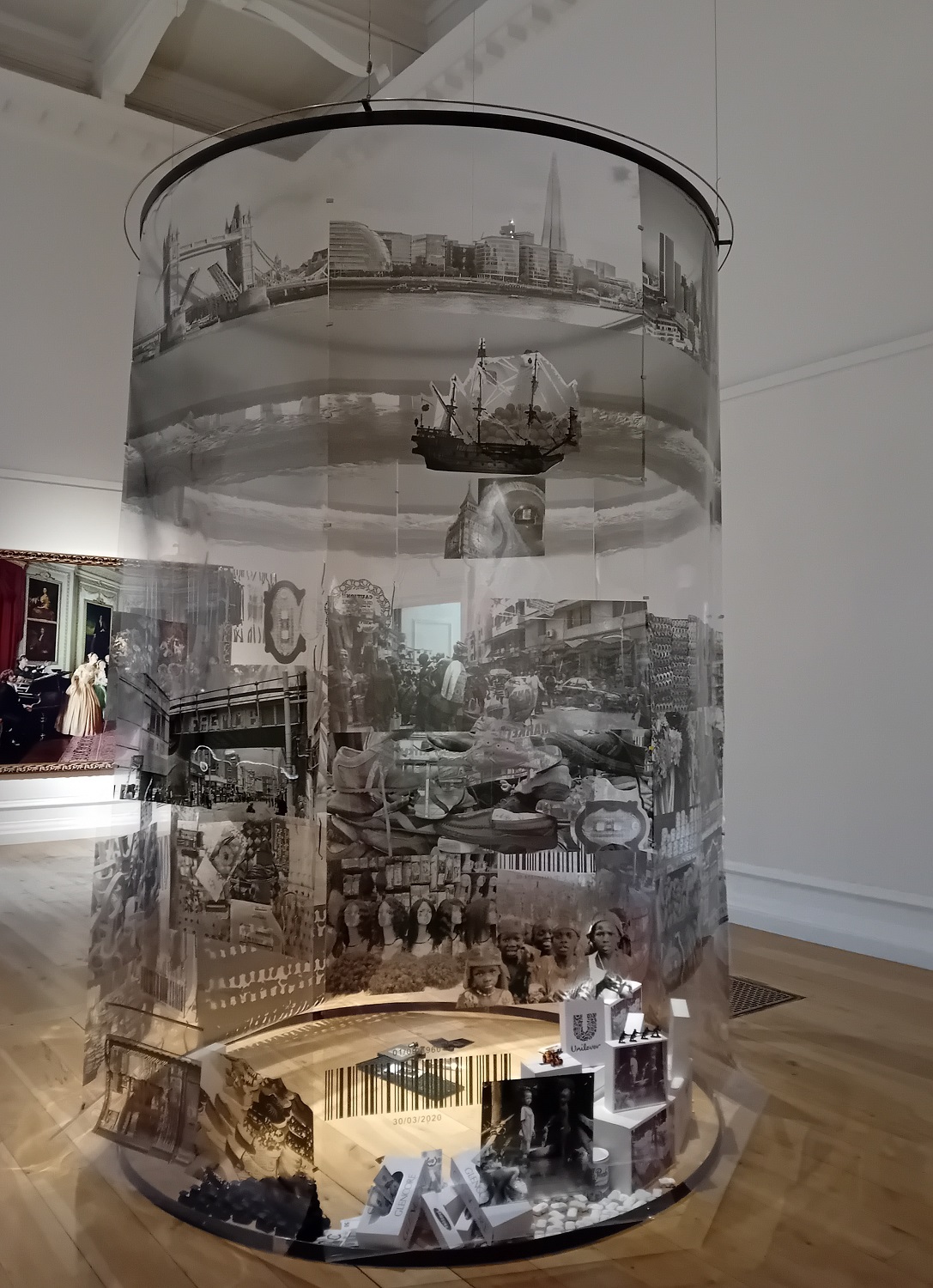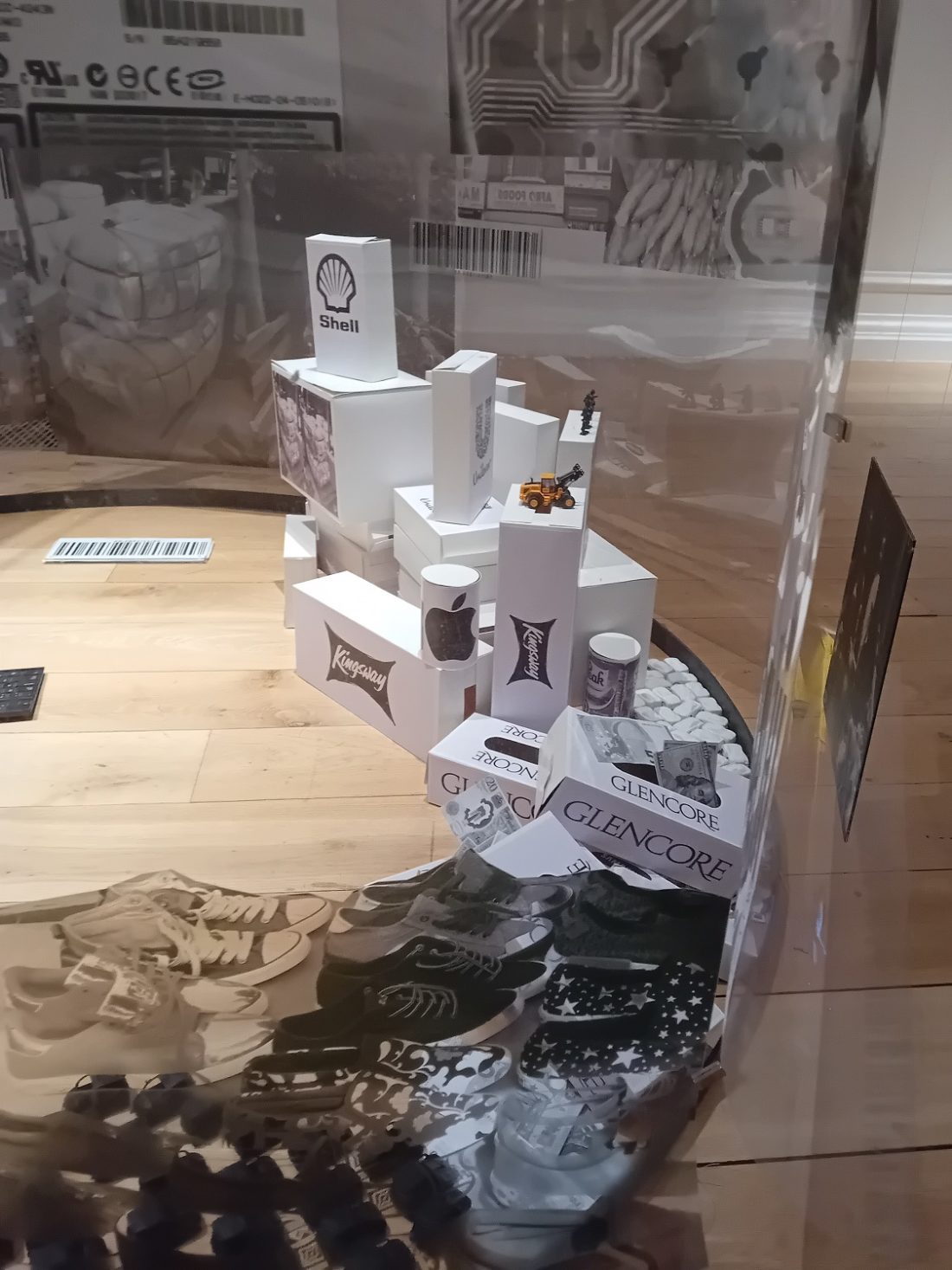
Image courtesy Ndidi Dike, 2023.
Artist Ndidi Dike has created a new work for the South London Gallery as part of Lagos, Peckham, Repeat: Pilgrimage to the Lakes.
The mixed media installation, titled Deciphering Value: Economic Anomalies and Unequal Dependencies in Global Commodity Trade, 2023, explores the concept of value. Dike reflects on ideas around market value and material value, value to the individual and value to human kind. She questions how value is shared, thinking about who benefits and who is exploited.
We spoke to Dike to find out more about the visuals in the installation and the inspiration behind the work.
Can you describe Lagos to someone who has never been there? How does the city inspire your work?
Lagos is the mega city that never sleeps. Its hustle and bustle constantly bombard me with emotional and visual triggers that appeal to my sculptor’s gaze which is usually more attuned to balance and order. This chaos helps me redefine my aesthetic viewpoint of the city and its markets. I employ a range of representational strategies photographs and mixed materials to address how Lagos is perceived and described – Lagos as chaotic.
From a personal standpoint, the resultant order in disorder has a rhyme and reason.

Image courtesy Ndidi Dike, 2023.
For your work at the SLG, you’ve included visuals from marketplaces, both in Lagos and in London. What does the marketplace represent for you?
There is a balance derived from chaos. Street markets are arranged with juxtaposing store fronts displaying a plethora of food, cosmetics, shoes, fabrics, household wares, and second-hand clothing (imported at the expense of our local textile industries). Together it all visually speaks about consumerism patterns, market trends, and dependency on predominantly imported commodities.
Each item has its own social and political narratives, stories about ownership and value and absence of barcoding. This intensity coupled with environmental conditions, competing amongst raging human traffic adds to our economies of desire. Each market has its own unique sense of identity. Ladipo in Nigeria is famous for car spare parts and fixing anything repairable. Rye Lane in Peckham displays very different products together, we see items such as afrocombs alongside mobile phones and clothes.
In my installation the strips of photographic transparencies are sourced from my personal archives, historical market research, and the internet. Their form evokes the dark narrow pathways, small corridors and sections potential customers have to navigate to hunt for desired commodities inside Balogun market.
As well as images of marketplaces, your work also includes found objects: vanilla pods, old electronics, branded packaging and Afrocombs. What do these items mean to you?
I use metaphorical objects, such as hanging metal vanilla, plastic army soldiers, photo printed plexi glass pieces, Afro combs, branded packages, Afrocombs bought from stores in Peckham markets, disused and obsolete electronic waste that refers to geo-political control and propaganda.
Outdated technology references the fact Nigeria is a dumping ground for outmoded technology. I have included batteries within the installation to question the ethics and politics surrounding production of batteries. A large percentage of the world’s cobalt is mined in the Global South often during internal wars and conflicts by a youthful population, children as young as five are known to have worked in mines in the Democratic Republic of the Congo.
80% of the world’s most popular spice, vanilla, comes from Madagascar, a country of 26 million people. Madagascar has one of the highest poverty rates in the world leading to vanilla being tattooed for easy identification. Farms are protected by farmers armed with guns.
The installation moves from the 2D to the 3D. It breaches the perceived boundaries of media and embracing an unfettered sense of space across local and global dialogues.
What do you attempt to do with this new work? What would you like visitors to take from it?
Uncomfortable discourses, realities and debates are presented. I want to raise questions around stories of human commodification and histories of exploitation and wealth generation in the Global North. My work explores the enduring colonial legacies of enslaved black bodies, the industrial complex of natural resources extraction, land and the issue of looted artefacts centuries ago from specific countries. This installation is an attempt to enact a conscious reflection of this cyclical complicity where choices impact and reverberate throughout the generations in the global south.
See Ndidi Dike‘s work as part of Lagos, Peckham, Repeat: Pilgrimage to the Lakes at the South London Gallery. Free to visit, until 29 October 2023.
Stay up to date with Dike’s work by visiting her website and following her on Instagram.

Image courtesy Ndidi Dike, 2023.